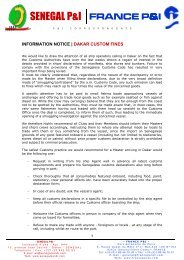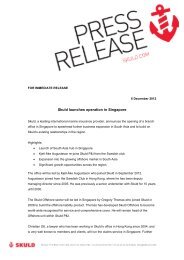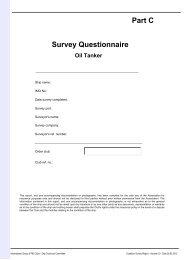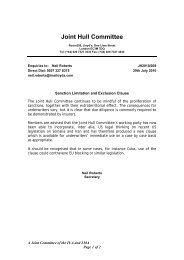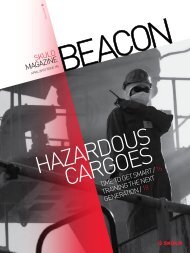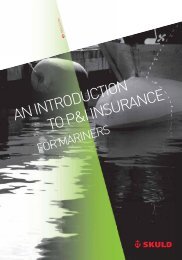Introduction to Private Maritime Security Companies (PMSCs)
Introduction to Private Maritime Security Companies (PMSCs)
Introduction to Private Maritime Security Companies (PMSCs)
Create successful ePaper yourself
Turn your PDF publications into a flip-book with our unique Google optimized e-Paper software.
<strong>Introduction</strong> <strong>to</strong> <strong>Private</strong> <strong>Maritime</strong> <strong>Security</strong> <strong>Companies</strong> (<strong>PMSCs</strong>)As the safety of ships, their crews, and cargo are increasingly put at risk of pirate attack, there has been a related spike in private counter piracy defense teamson board vessels transiting at-risk zones. In an attempt <strong>to</strong> clarify this emerging industry, we have begun <strong>to</strong> map the field, examining closely the key players, theguiding documents and the various stances on private security. While this examination helped <strong>to</strong> detail developments within the private maritime securityindustry, much of the future remains unclear. There are many legal and logistical challenges <strong>to</strong> the use of armed guards aboard ships that have not yet beenresolved.Key findings:Documents such as the International Code of Conduct for <strong>Private</strong> <strong>Security</strong> Providers, the Montreaux Document and MSC. Circ. 1404 suggest pro<strong>to</strong>col forprivate security teams, but have no legal status and no standardized training or certification <strong>to</strong> ensure compliance with guidelines.Currently the regulation meant <strong>to</strong> ensure quality of the private security industry is weak, making it difficult for shipowners <strong>to</strong> discern reputablecompanies offering private security. There is no required reporting of incidents, although it is recommended in all of the guiding documents.Flag State policies regarding the use of armed guards vary greatly; many policies are not reported.International navies, IMB, INTERPOL and UKMTO have a neutral or no stance <strong>to</strong>ward the use of private armed security. The IMO considers the use ofprivate armed security <strong>to</strong> be a Flag State concern. There are varying stances among shipping companies, Flag States and Regional Nations regarding theirusage, indicating that this industry is still very new and international bodies are still developing their official policies <strong>to</strong>ward its usage.
Interim Guidance <strong>to</strong>UK Flagged Shippingon the Use of ArmedGuards <strong>to</strong> DefendAgainst the Threa<strong>to</strong>f Piracy inExceptionalCircumstances(Developed by UKDepartment forTransport)November 2011Created for shippingcompanies and theship’s masters of UKflagged ships“The government recognizesthat the engagement of armedguards is an option <strong>to</strong> protecthuman life onboard UKregistered ships from thethreat of piracy, but only inexceptional circumstances andwhere it is lawful <strong>to</strong> do so.”“Exceptional circumstancesunder which armed guardsmay be employed for useonboard UK flagged ships are: When the ship istransiting the highseas throughout theHigh Risk Area… The latest BMP isbeing followed fullybut, on its own, is notdeemed by theshipping companyand the ship’s masteras sufficient <strong>to</strong>protect against acts ofpiracy; AND The use of armedguards is assessed <strong>to</strong>reduce the risk <strong>to</strong> thelives and well-being ofthose onboard theship.“The government does not currentlyrecognize an accreditation process forPSCs operating in the maritime sec<strong>to</strong>r.Shipping companies must, therefore,be extra vigilant in selecting anappropriate PSC <strong>to</strong> provide armedsecurity onboard their ships.”“To assess the suitability and capabilityof the PSC <strong>to</strong> provide the specializedservice of protecting a ship from pirateattack, the shipping company shouldsatisfy itself that the PSC has:” Relevant and recent maritime (asopposed <strong>to</strong> land-based)experience; An accurate understanding of thelocal piracy threat Written procedures onmanagement Access <strong>to</strong> competent maritimelegal advice Appropriate insurance cover Understanding of port State andcoastal State laws with respect <strong>to</strong>firearms, ammunition and othersecurity related equipment Understanding of UK laws andrequirements with respect <strong>to</strong>firearms, ammunition and othermilitary/paramilitary equipment Understanding of post-incidentprocedures <strong>to</strong> support UK Policeand the Crown ProsecutionService, should a formalinvestigation be required“Under UK jurisdiction, aperson may use such forceas is reasonable in thecircumstances for thepurposes of self-defense;defense of another;defense of property;prevention of crime; orlawful arrest. Legalguidance on self-defenseand the prevention ofcrime in UK law is availableonline…”“The shipping companyand PSC must agree uponthe rules for the use offorce that the armedsecurity personnel willoperate within, basedupon the applicable laws.All members of the armedsecurity team must fullyunderstand the rules of theuse of force and complywith them.”Specific firearms• Following pirate attackincident reports (<strong>to</strong>(as soon as possible butbe completed any“certainly within 6time a firearm ishours,”) ship’s masterdischarged,and security team leaderwhether accidentalshould submit a writtenor deliberate)incident report <strong>to</strong>should includeUKMTO, MSCHOA andtime and locationthe IMB in accordanceof incident; detailswith BMPof events leadingDfT should also be copiedup <strong>to</strong> the incident;– <strong>to</strong> assist DfT <strong>to</strong>details of themaintain a completeincident; theunderstanding of theidentify and detailsthreat that UK flaggedof personnelships are under, and theinvolved in theeffectiveness of differentincident, andself-protection measureswitnesses; written(including armed guards)statements fromin preventing acts ofthose involved andpiracywitnesses; pho<strong>to</strong>s;video surveillance;“Firearms reports mustdetails of injuriesbe sent <strong>to</strong> DfT. DfT willand/or materialforward reports on<strong>to</strong> thedamage; lessonsHome Office and the UKlearned from thePolice.”incidentNot discussedNone apparent, but postincidentevidence gathering“should be in accordancewith the guidancecontained in the CrimeManual for Ships <strong>Security</strong>Officers produced by theAssociation of Chief PoliceOfficers (ACPO). The ship’sMaster and the securityteam leader should provideany investigation with allnecessary assistance.”
MSC. Cir 1405, 1406,and 1408(Developed by IMO)May 2011*1405 and 1406revised September2011(Respectively)Shipowners, shipopera<strong>to</strong>rs, andshipmastersFlag StatesPort and CoastalStates• According <strong>to</strong> Flag State policy• Shipmaster remains incommand at all times• Weapon embarkation anddisembarkation contingent oncoastal and port state law“The PMSC should be able <strong>to</strong> providedocumentary evidence which may include”:• <strong>Maritime</strong> experience• Written management procedures• Testimonials/references• Proof of legality of firearms• Understanding of Flag, Port and CoastalState regulations• Knowledge of Somali piracy threat• BMP understanding• Access <strong>to</strong> legal advice• Criminal, employment and militarybackground checks Medical, physical,mental fitness records• Verifiable system in place <strong>to</strong> ensurecontinued suitability of employedpersonnel• Relevant experience with firearms <strong>to</strong> bedeployed• Systems for provision of security identitydocumentation, travel documents, andvisas• Should comply withstandards set forth byFlag, Coastal and PortState Authorities• Should take allreasonable steps <strong>to</strong>avoid the use of force• Should not use firearmsexcept in self-defense,or defense of othersagainst the imminentthreat of death orserious injury• Shipmaster maintainslog of instances whenfirearms aredischarged• <strong>Security</strong> team shouldsubmit full report <strong>to</strong>shipowner & shipopera<strong>to</strong>r following <strong>to</strong>urof duty detailing:deployment, operationalmatters, training and/orship hardeningconducted, andrecommendationsNot discussedNone apparentGuidance on theSelection of <strong>Private</strong><strong>Security</strong> <strong>Companies</strong>(Developed byNorwegianShipowners’sAssociation MutualWar Risks InsuranceAssociation)March 2011• Members of theNorwegianShipowners’ MutualWar Risks InsuranceAssociation• Flag State laws and regulationsare applied <strong>to</strong> all vessels• Shipmaster retains ultimatecontrol and responsibility forthe safety and security of theship, and shall be consultedbefore any firearms aredeployed (this does not affecta <strong>Security</strong> Opera<strong>to</strong>r’s right <strong>to</strong>self-defense)“Should be” :• Accredited by “an established andreputable organization”• <strong>Companies</strong> should be ICoC signa<strong>to</strong>ries• <strong>Maritime</strong> experience• Publicly available code of conduct andcode of business ethics• Membership in “appropriate professionalorg”• Employees of PSMCs should be trained inRules of Force, and maintain up-<strong>to</strong>-datefirearms licenses• PSMC <strong>to</strong> be insured• Detailed info about firearms availablePro Forma Rules for theUse of Force:• Identify Hostile Intent• Challenge hostile intentw/ verbal or equivalentaction• Warning shots• Lethal force only used asabsolute last resort <strong>to</strong>protect someone’s lifeSpecific rules must beclear, unambiguous, andavailable upon request• Requires Members<strong>to</strong> report <strong>to</strong> DNKon employment ofarmed guards• UKMTO receivesand coordinatesincident details• Company <strong>Security</strong>Officer shall becontacted andasked fordirections• UKMTO receives incidentreports before vesselleaves the areaNot discussedNone apparent
Guidelines onDeployment ofArmed <strong>Security</strong>Guards on MerchantShips(Developed by IndianShipping Ministry)August 2011Indian Shipowners• “Indian ship owners maydeploy armed security guards,subject <strong>to</strong> their riskassessment particularly forships which bear slow speedand have low freeboard.”• “Strongly recommended thatshipowners consult theirinsurers prior <strong>to</strong> deployingprivate armed security guardson their ships.”“Should be able <strong>to</strong> provide documentaryevidence which may include”:• <strong>Maritime</strong> experience• Written procedures on management• Understanding of Flag State, Port Stateand Coastal State requirements withrespect <strong>to</strong> carriage and usage offirearms• Availability of written testimonials/references from previous clients• Documentary evidence of legality offirearms• Understanding of the Somalia-basedpiracy threat• Understanding of anti-piracy measures• Access <strong>to</strong> legal advices• Criminal background checks ofemployees• His<strong>to</strong>ry of employment checks• Military and law enforcementbackground checks, where applicable• Records of medical, physical andmental fitness• Verifiable system in place <strong>to</strong> ensurecontinued suitability for employmen<strong>to</strong>f their personnel• Documentary evidence of relevantexperience and certification in the useand carriage of firearms <strong>to</strong> bedeployed• System for provision of securityidentity documentation, traveldocuments and visas• “The on board armedguard team should befully aware that theirprimary function isthe prevention ofboarding using theminimal forcenecessary <strong>to</strong> do so.”• “If force is used, itshould be in amanner consistentwith applicable law.”• “The Mastershould maintain alog of everycircumstance inwhich firearms aredischarged”• “If force is used,team leader shouldpho<strong>to</strong>graph, log,report and collatewritten statementsfrom all personspresent at theincident inanticipation oflegal proceedings.”• “…it is suggestedthat following a<strong>to</strong>ur of duty, theonboard teamshould submit a fullreport <strong>to</strong> theshipowner and theflagadministration”providing “fulldetails of thedeployment,operationalmatters, anytraining and/orship hardeningconducted andoffering advice as<strong>to</strong> any otherenhancements <strong>to</strong>security that maybe considered.”• Post-<strong>to</strong>ur reports shouldbe delivered <strong>to</strong> theshipowner and the FlagStateNot discussedNone apparent
Counter-Piracy Stakeholders and <strong>Private</strong> <strong>Maritime</strong> <strong>Security</strong> <strong>Companies</strong>:Organization Stance For or Against <strong>PMSCs</strong> Guidelines Supported Preferred Vetting Process Access <strong>to</strong> Incident ReportsInternational Navies“does not encourage or discourage”“completely agnostic”MSC HoA asks that ships indicate presenceof security teamNo stance on individual firmsReceives info thru:• UKMTO• Regional Coordination CenterIMBDoes not support; acknowledges theneed, but with concernNo stanceNo stanceReceives post-incident information on a voluntarybasis from shipownersShipping IndustryVaries by Shipping Company• Flag State Guidelines• BMP 4• Varies by national associationsVarious standards. Recommendations onhiring requirements.For ICoC signa<strong>to</strong>ries only, shipowners receive incidentreports directly from <strong>PMSCs</strong> (see Documents: ICoC)Flag States (See next slide foradditional information)Varies by Flag State Varies by Flag State Varies by Flag State Varies by Flag StateRegional Nations Varies by Nation and Port Some agreements with Specific <strong>Companies</strong> No stance No official accessIMO<strong>Maritime</strong> security is considered a FlagState concernSee Document: MSC. Cir. 1405, 1406, 1408 See Document: MSC. Cir. 1405, 1406, 1408 No official accessINTERPOL No stance No stance No stance No official accessShipmasters(IFSMA)“IFSMA strongly opposes the idea ofarming the ships either with weaponsfor seafarers <strong>to</strong> use or having anarmed force on board.” – IFSMAPolicy DocNo stance None established No official access<strong>Security</strong> Association of the<strong>Maritime</strong> Industry (SAMI)Supports their use following a full riskassessment; wants them <strong>to</strong> becertified through SAMI• MSC Circular 1405• Int. Code of Conduct• Norwegian Shipowners GuidanceEventually: documentary check,verification visit, and on-scene surveyrequisite for company <strong>to</strong> become SAMImemberNo official access; believes access should be providedas required by employer and flag, coastal, and portState laws, and according <strong>to</strong> MSC Circulars 1404 and1405UKMTO No stance No stance No stanceReceives reports from shipowners per BMP (seeDocuments: BMP4)
Flag States’ Stance on <strong>Private</strong> <strong>Maritime</strong> <strong>Security</strong> <strong>Companies</strong>:The table below is intended <strong>to</strong> provide a concise snapshot understanding of Flag States’ views <strong>to</strong>wards armed security. Information is not available for all Flag States. Given the relatively recent focus on the use of maritime security, Flag States’ support orregulation of security, especially armed security, is changing all the time. For example, some Flag States allow arms <strong>to</strong> be used on a case-by-case basis. There are also multiple different licenses that need <strong>to</strong> be obtained prior <strong>to</strong> using armed guards. It istherefore imperative that all decisions regarding the use of armed guards include open dialogue between the shipowner and the flag state. For more detail, see International Chamber of Shipping/ECSA Table on Flag State Rules and Requirements on Armsand <strong>Private</strong> Armed Guards On Board Vessels here.In order <strong>to</strong> reflect recent changes in the industry, the table below was last updated on December 7, 2011. Much of the original information contained in our table was derived from “Locked and Loaded: What a Shipowner Needs <strong>to</strong> Know when Consideringthe Use of Armed <strong>Security</strong> Guards,” a presentation by P&I Club, the American Club, created in June 2011. OBP has since been independently updating information, beginning in September 2011. OBP acknowledges that this industry is rapidly evolving andwe will continue <strong>to</strong> amend our information as developments become available.FLAG STATE ALLOWS PROHIBITS NO OFFICIAL FLAG STATE ALLOWS PROHIBITS NO OFFICIALSTANCESTANCEAntigua & Barbuda Japan Bahamas Liberia Belgium Lithuania Cyprus * Marshall Islands Denmark Netherlands ****Finland ** Norway France Panama Germany *** Poland Greece Portugal Hong Kong Singapore Isle of Man Spain India UK Italy USA ******In September 2011, Bloomberg via Cyprus News Agency reported that Cyprus was changing a law <strong>to</strong> allow merchant ships <strong>to</strong> carry gunmen as protection against pirates.**See ICS/ECSA table for further explanation.***Per International Law Office: http://www.internationallawoffice.com/newsletters/detail.aspx?g=baf40aa7-a2bd-439c-807b-9ad2ee66d90a*** *The Chairman <strong>to</strong> a special committee on private security for the Netherlands stated that “We’re not saying private security is not allowed. All we’re saying is: don’t start there.”*****The US Department of State issued a statement in July 2011 “insisting” that all US-flagged vessels carry security personnel, whether armed or unarmed.



